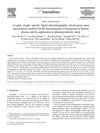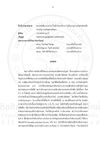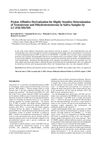 20 citations,
September 2016 in “Indian Journal of Dermatology, Venereology and Leprology”
20 citations,
September 2016 in “Indian Journal of Dermatology, Venereology and Leprology” Platelet-rich plasma treatment significantly increased hair diameter and density, stopped hair fall, and boosted hair growth in men with hair loss, with no reported side effects.
 8 citations,
April 1988 in “Journal of endocrinological investigation”
8 citations,
April 1988 in “Journal of endocrinological investigation” Topical spironolactone cream doesn't cause hormone-related side effects in the body.
 January 2018 in “Springer eBooks”
January 2018 in “Springer eBooks” Lasers are less favored for hair transplant surgery but show promise for hair growth in controlled trials.
 15 citations,
January 2016 in “Przeglad Menopauzalny”
15 citations,
January 2016 in “Przeglad Menopauzalny” Eating a balanced diet with specific nutrients is important for menopausal women to manage hair loss.
 80 citations,
January 1988 in “The Journal of clinical endocrinology and metabolism/Journal of clinical endocrinology & metabolism”
80 citations,
January 1988 in “The Journal of clinical endocrinology and metabolism/Journal of clinical endocrinology & metabolism” Spironolactone can cause side effects like irregular bleeding, but lower doses may reduce these effects and still improve hirsutism.
 July 2024 in “Forum Dermatologicum”
July 2024 in “Forum Dermatologicum” Topical treatments for hair loss can be effective but need careful safety evaluation.
 30 citations,
January 2000 in “Dermatologic Clinics”
30 citations,
January 2000 in “Dermatologic Clinics” Finasteride and minoxidil are effective FDA-approved treatments for androgenetic alopecia.
 12 citations,
March 2017 in “Journal of obstetrics and gynaecology Canada”
12 citations,
March 2017 in “Journal of obstetrics and gynaecology Canada” Testosterone therapy can modestly improve sexual function in menopausal women but should be used cautiously and is not recommended for routine measurement in sexual dysfunction or hirsutism.
 June 1995 in “International Journal of Gynecology & Obstetrics”
June 1995 in “International Journal of Gynecology & Obstetrics” Long-term use of oral contraceptives, especially starting before age 20, may increase the risk of early-onset breast cancer.
 1 citations,
April 2017 in “Drugs & Therapy Perspectives”
1 citations,
April 2017 in “Drugs & Therapy Perspectives” Use antiandrogens and other treatments for hair loss.
 10 citations,
January 2003 in “Seminars in reproductive medicine”
10 citations,
January 2003 in “Seminars in reproductive medicine” The article explains how to identify and treat excessive hair growth in women, which can be distressing and may signal other health problems.
 57 citations,
May 1986 in “Clinics in endocrinology and metabolism”
57 citations,
May 1986 in “Clinics in endocrinology and metabolism” Androstanediol glucuronide is a reliable marker for hirsutism in women.
 8 citations,
October 1988 in “Clinics in Dermatology”
8 citations,
October 1988 in “Clinics in Dermatology” Current research explores hair growth drugs, while future research aims for personalized treatments.
 3 citations,
November 2017 in “International Journal of Pharmacy and Pharmaceutical Sciences”
3 citations,
November 2017 in “International Journal of Pharmacy and Pharmaceutical Sciences”  17 citations,
January 1986 in “Acta obstetricia et gynecologica Scandinavica”
17 citations,
January 1986 in “Acta obstetricia et gynecologica Scandinavica” Spironolactone can reduce hair growth and testosterone in hirsutism, but is less effective than combined treatments.
 54 citations,
June 1985 in “American Journal of Dermatopathology”
54 citations,
June 1985 in “American Journal of Dermatopathology” Minoxidil helps grow longer, thicker hair in bald scalps of stumptailed macaques, and early treatment is more effective.
 22 citations,
July 2007 in “Spectrochimica Acta Part A: Molecular and Biomolecular Spectroscopy”
22 citations,
July 2007 in “Spectrochimica Acta Part A: Molecular and Biomolecular Spectroscopy” New method accurately measures finasteride in tablets.
 192 citations,
September 2003 in “The Journal of clinical endocrinology and metabolism/Journal of clinical endocrinology & metabolism”
192 citations,
September 2003 in “The Journal of clinical endocrinology and metabolism/Journal of clinical endocrinology & metabolism” Metformin is effective for treating excessive hair growth in women with PCOS and may work better than the standard treatment in some ways.
 15 citations,
March 2007 in “Journal of Pharmaceutical and Biomedical Analysis”
15 citations,
March 2007 in “Journal of Pharmaceutical and Biomedical Analysis” Method measures finasteride in plasma, suitable for pharmacokinetic studies.
 19 citations,
January 2016 in “Biological & Pharmaceutical Bulletin”
19 citations,
January 2016 in “Biological & Pharmaceutical Bulletin” Sargassum muticum extract and its component apo-9'-fucoxanthinone may help hair growth and treat hair loss.
January 2022 in “Springer eBooks”  5 citations,
March 2020 in “Current Opinion in Endocrine and Metabolic Research”
5 citations,
March 2020 in “Current Opinion in Endocrine and Metabolic Research” Skin problems in PCOS, like excess hair, acne, and hair loss, may not always indicate high male hormone levels and need careful diagnosis for proper treatment.

The document concludes that non-endocrine alopecia in pets varies in treatment effectiveness and often has a poor prognosis, especially in cats.

Safflower extract in nanostructured carriers was more effective than minoxidil for hair growth without irritating skin.
 17 citations,
February 2014 in “The International Journal of Neuropsychopharmacology”
17 citations,
February 2014 in “The International Journal of Neuropsychopharmacology” 
Three Indian medicinal plant compounds help hair growth.
 8 citations,
July 2018 in “Analytical sciences”
8 citations,
July 2018 in “Analytical sciences” Using 5-butylpicolinate esters improves the sensitivity and reliability of detecting testosterone and dihydrotestosterone in saliva.
 1 citations,
May 2024 in “Dermatology and Therapy”
1 citations,
May 2024 in “Dermatology and Therapy” Frontal Fibrosing Alopecia needs better diagnostics and treatments, with dutasteride showing promise.
 33 citations,
January 1997 in “Endocrinology”
33 citations,
January 1997 in “Endocrinology” Testosterone can slow down hair growth when combined with certain cells from bald scalps, and this effect can be blocked by an androgen receptor blocker.

Eclipta alba L. (Urang-Aring) can help treat hair loss.




























